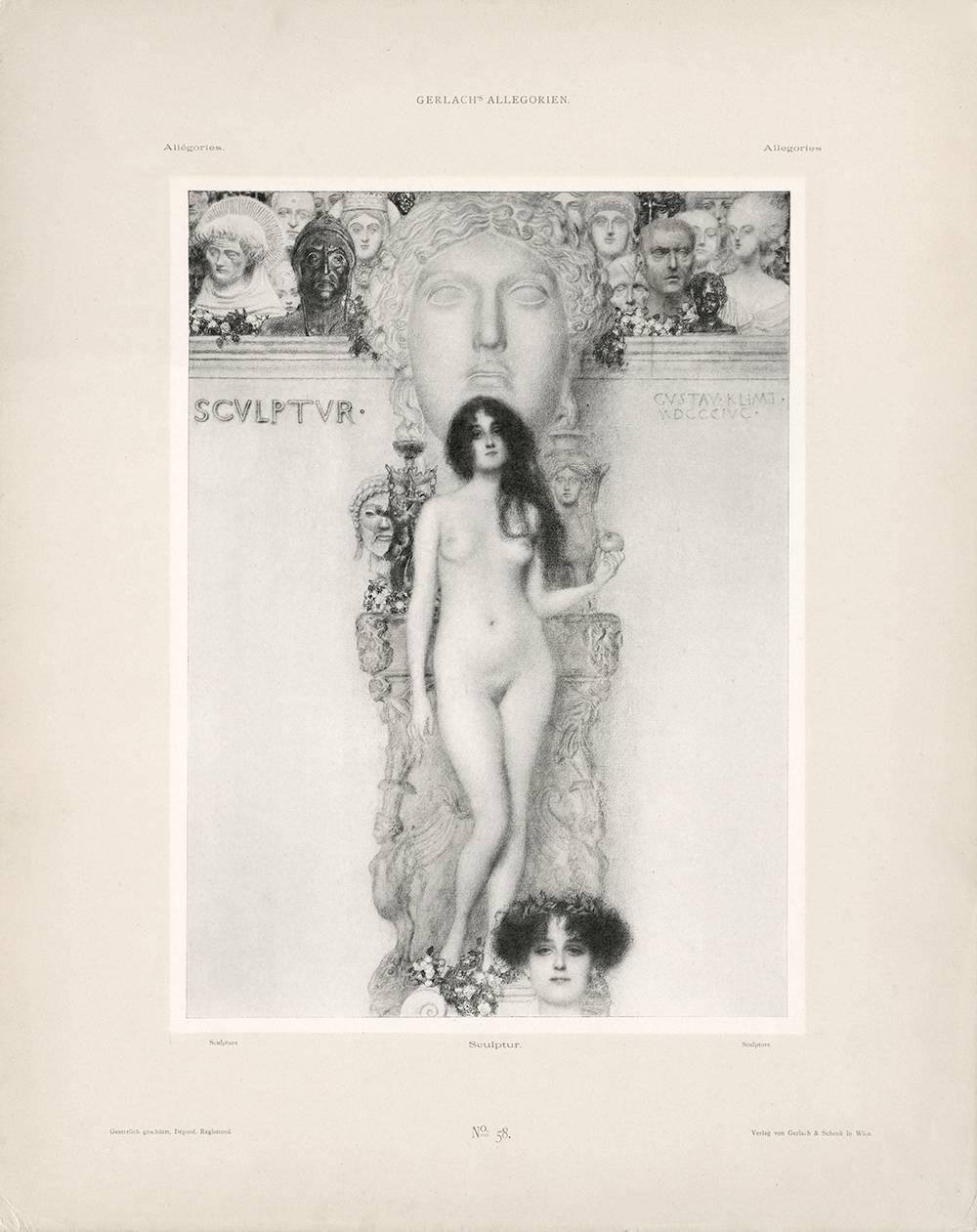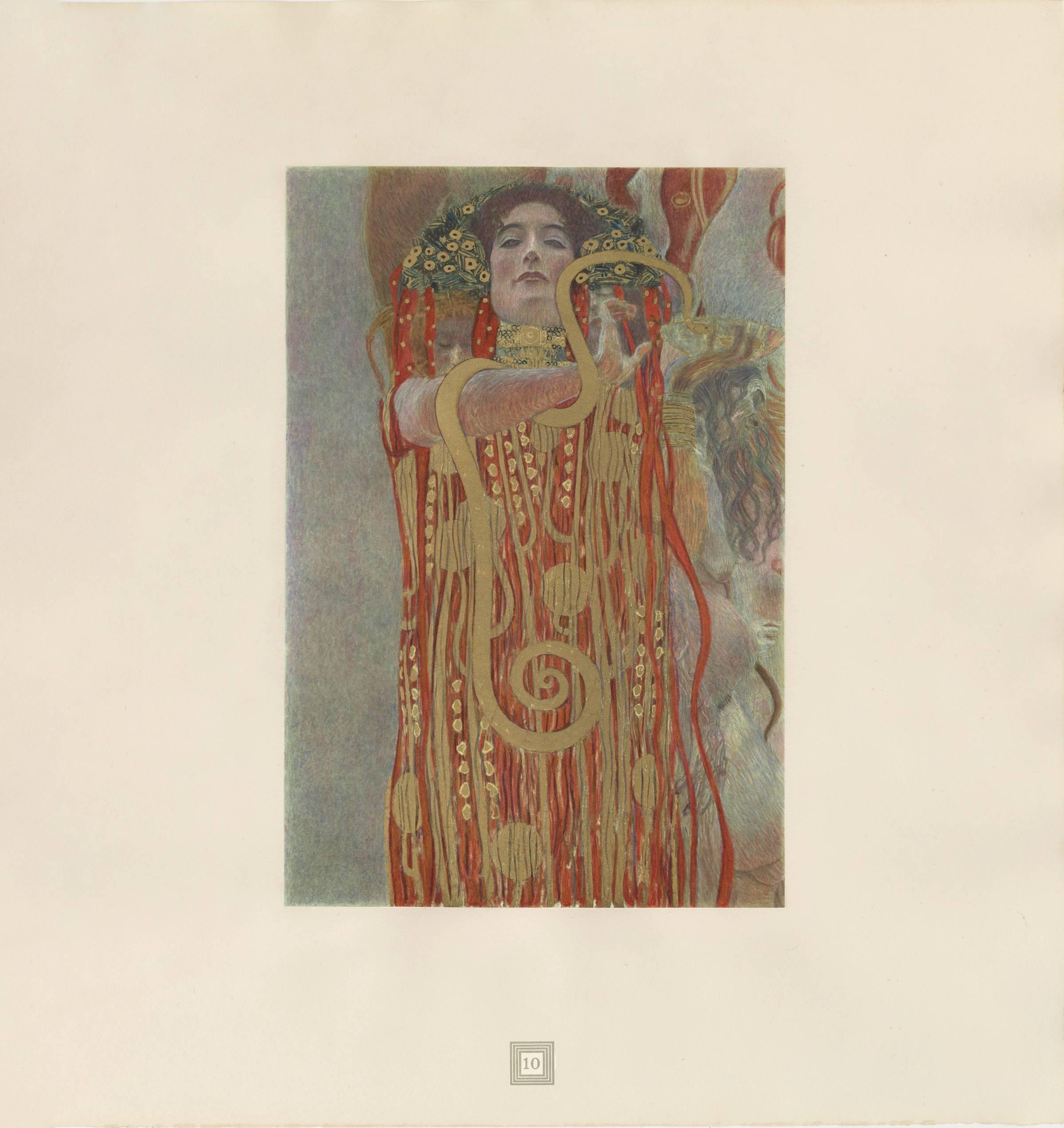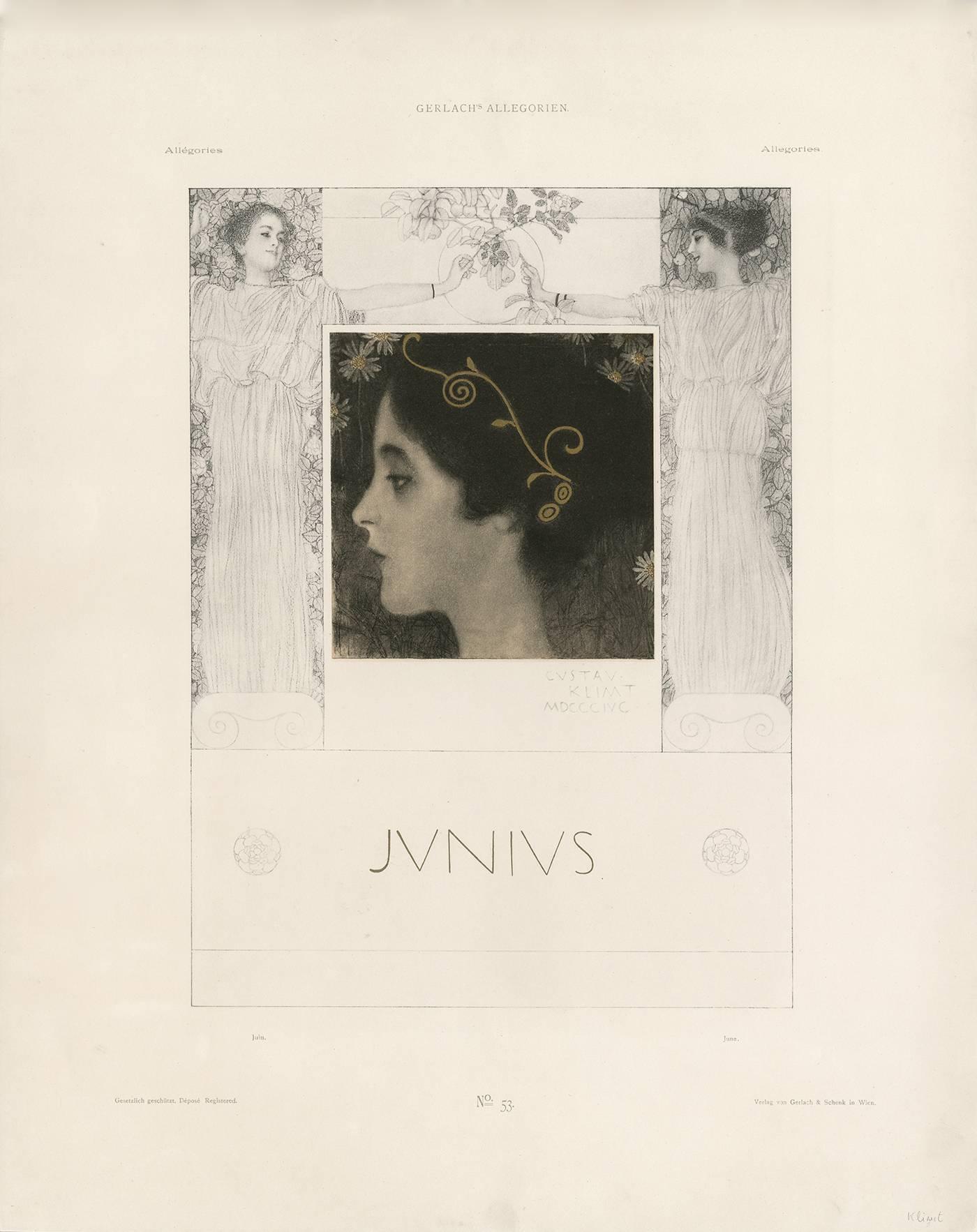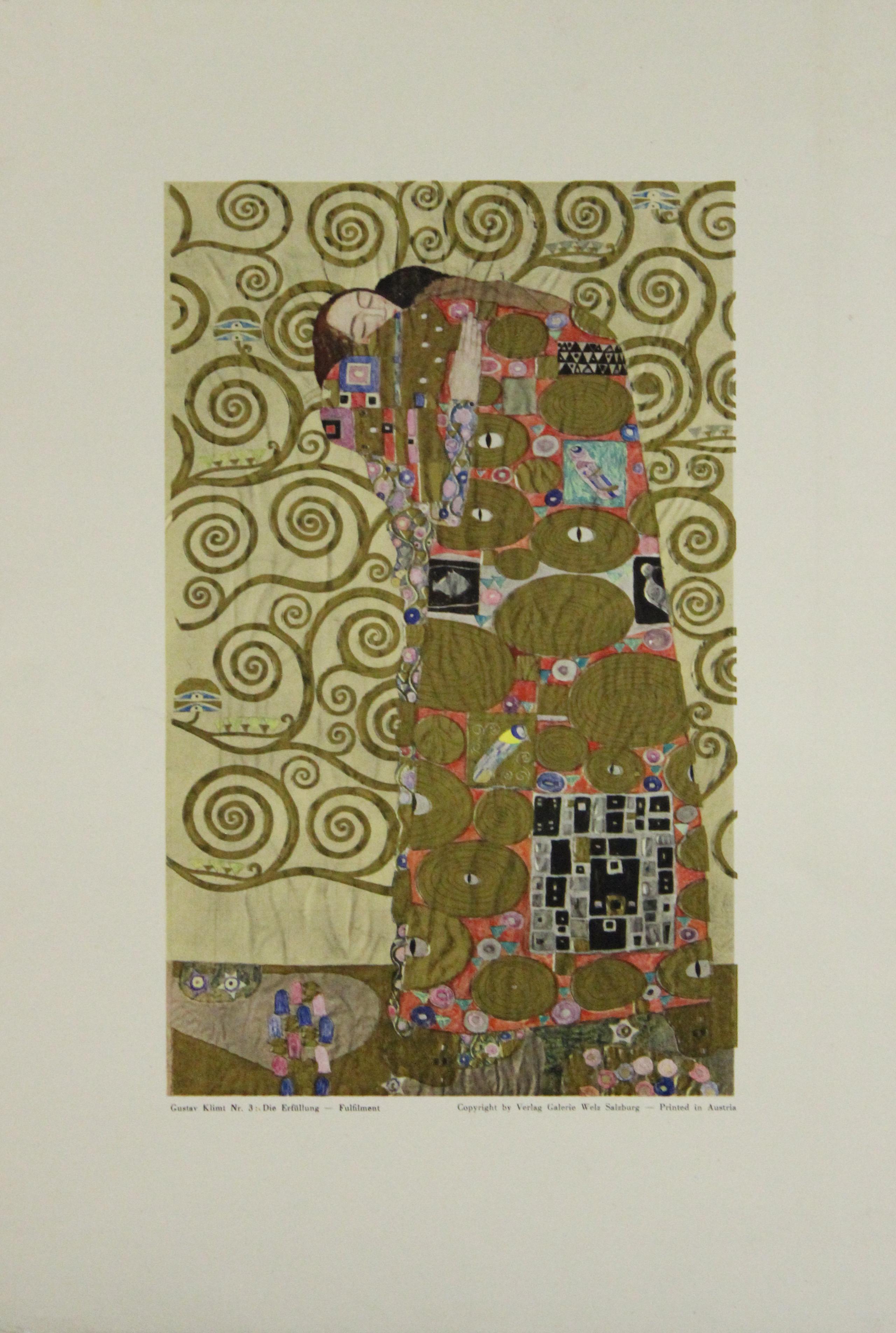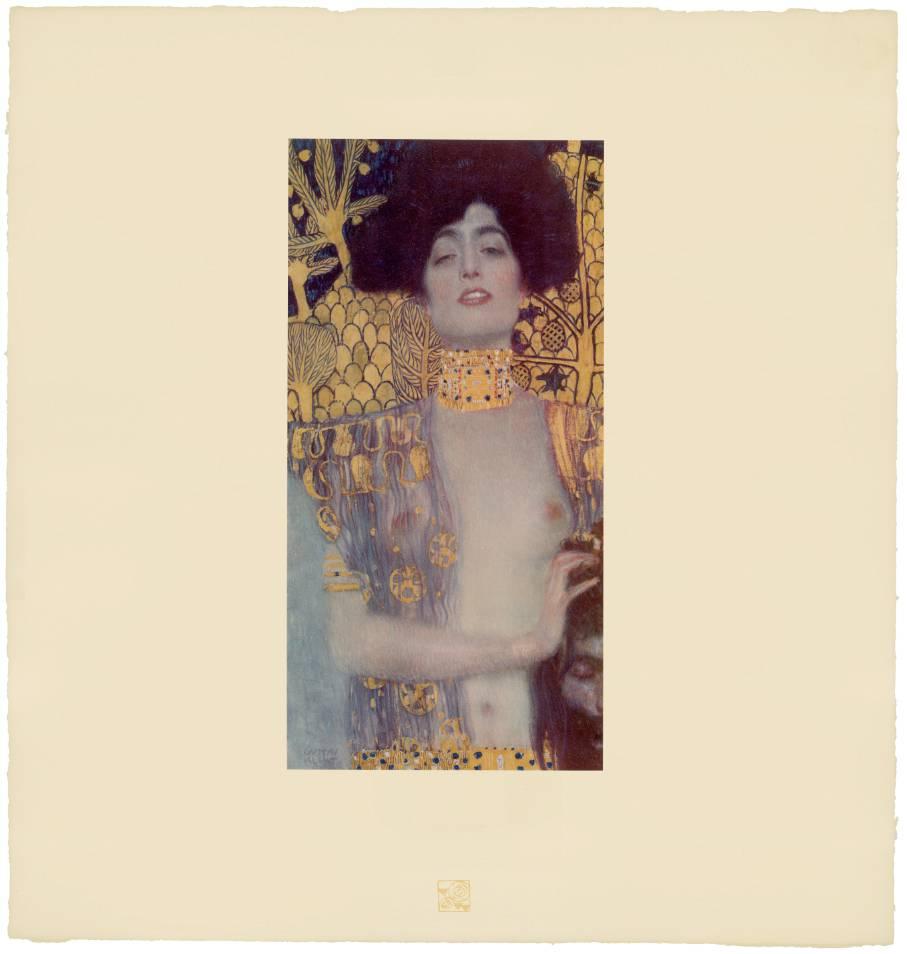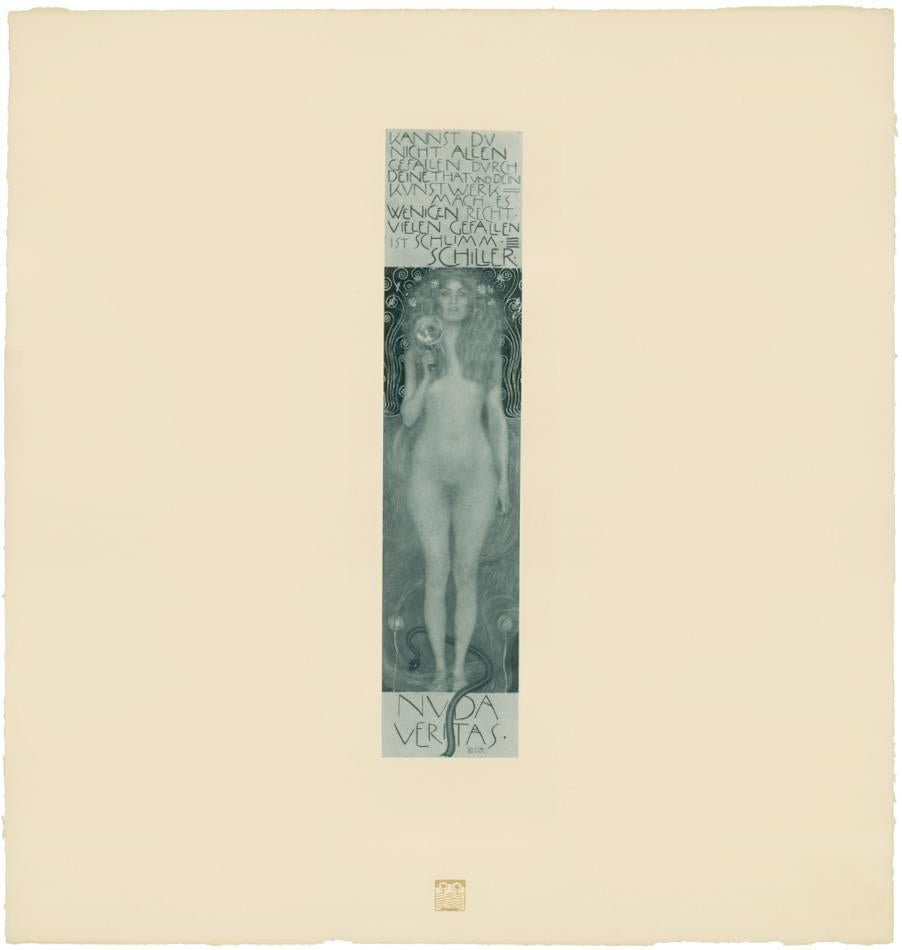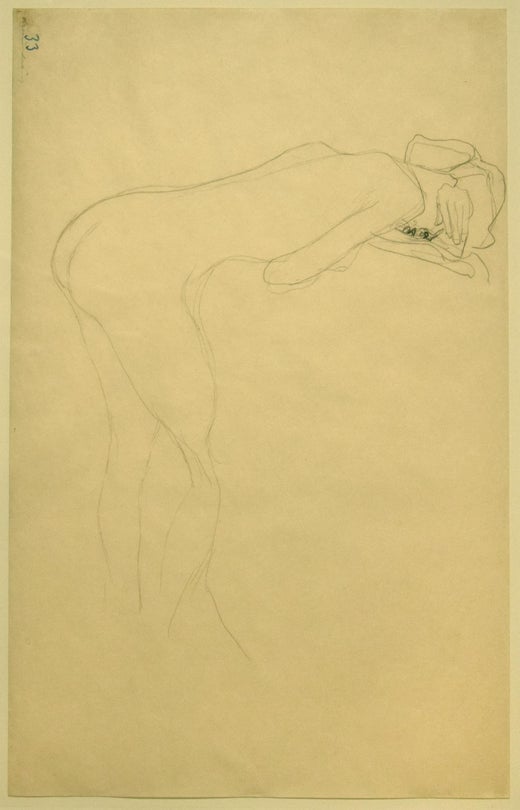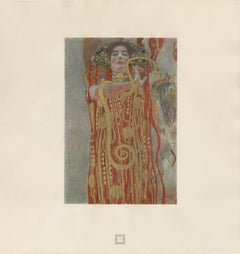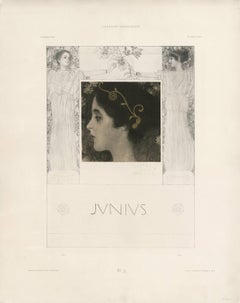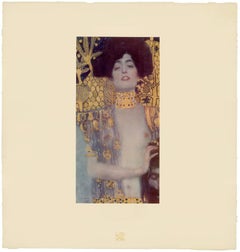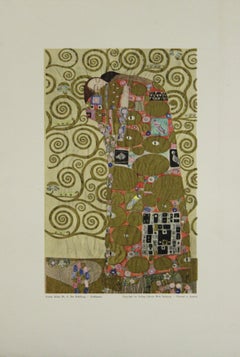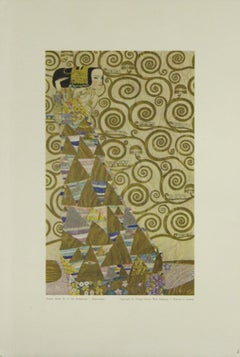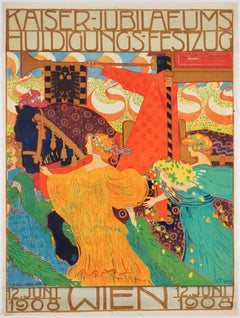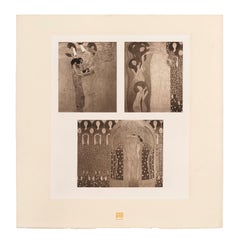Items Similar to Ottokar Mascha Folio, plate 8: "Poster for the 1st Vienna Secession Exhibition"
Want more images or videos?
Request additional images or videos from the seller
1 of 6
Gustav KlimtOttokar Mascha Folio, plate 8: "Poster for the 1st Vienna Secession Exhibition"1915
1915
$10,500
£8,020.97
€9,215.28
CA$15,012.74
A$16,540.55
CHF 8,562.39
MX$199,152.45
NOK 108,420.54
SEK 101,854.24
DKK 68,809.61
About the Item
After GUSTAV KLIMT (1862-1918) THESEUS UND MINOTAURUS, 1898, final design submission for poster advertising the first exhibition of the Vienna Secession, (In Mascha, no. 8) As a celebrated Austrian artist and President of the newly formed Vienna Secession, it was especially fitting that Klimt designed the poster advertising the group’s first exhibition. Klimt takes an iconoclastic approach to allegory: “Theseus killing the Minotaur”, taken from Ancient Greek mythology, personifies the fight of Modern Free Art against Academic Art. Ironically, the Austrian government censored this version for what they deemed to be too overtly rendered male genitalia; a subsequent and final version of this poster’s image shows the addition of tree branches. Perhaps Klimt’s free speech is better voiced in the poster’s modern design vocabulary which features a central monochromatic panel balanced by geometric sections of vertical and horizontal rectangles and a circular shield. These same elemental shapes dominate the block lettering and stylized pattern found on Athena’s helmut and shield.
OTTOKAR MASCHA (1852-1929), OSTERREICHISCHE PLAKATKUNST, 1915, J. Lowy Printer, in an edition of 230. Framed (see images).
Austria’s foremost collector of poster prints, Ottokar Mascha amassed one of the largest international graphic art collections of the time. He was an active member in poster-collecting societies, and he gave generously to educational and other public institutions. In many cases, examples found in his collections were the sole survivors of an ephemeral medium whose delicate papers could not hold up over time to the damaging effects of animal glue, weathering, and other wear and tear from excessive handling. Mascha recognized that posters were not only cultural documents, but works of art. He devised ways to obtain pristine examples for his collection often through the police with whom posters needed to be submitted for approval prior to being hung in public. As Mascha explains in the forward and introduction of Plakatkunst, he saw a need in Austria for developing and promoting the poster as an artistic medium. His aims in publishing Plakatkunst were lofty; Mascha hoped to educate new and aspiring Austrian artists by exposing them to the possibilities the poster medium offered, and he hoped to develop a broader collector base through connoisseurship. His carefully selected examples of posters from his collection are archives of a nearly lost time. Preserved within this rare printed work are contextual links to Austria’s interconnected modern arts culture of which the Vienna Secession played a central role. Like the members of Vienna’s Secession, Mascha believed that modernity required a new definition of Art and that old hierarchical notions were out of touch. Creating a leveling force in the arts, where graphic and applied arts are valued equally as painting, sculpture and architecture, was an over-arching goal many were grappling to achieve at this time. He also shared the belief that, whether native or adoptive, there was, indeed, an Austrian sensibility whose zeitgeist he wanted to capture and preserve. For him, it was a question of accessibility. Today, bombarded as we are with digital and graphic images and their instant access we have literally at our fingertips, it is easy to forget that 100 years ago this was simply not the case. Plakatkunst, was, and is, an invaluable resource; it is a bold statement which continues to resound that the artistic merit of successful posters will stand the test of time.
- Creator:Gustav Klimt (1862 - 1918, Austrian)
- Creation Year:1915
- Dimensions:Height: 22 in (55.88 cm)Width: 18.5 in (46.99 cm)Depth: 3 in (7.62 cm)
- Medium:
- Movement & Style:
- Period:
- Condition:
- Gallery Location:Chicago, IL
- Reference Number:1stDibs: LU467314042672
Gustav Klimt
Gustav Klimt was an Austrian symbolist painter and a prominent member of the Vienna Secession movement. Klimt's primary subject was the female body and his works are mostly erotic in nature.
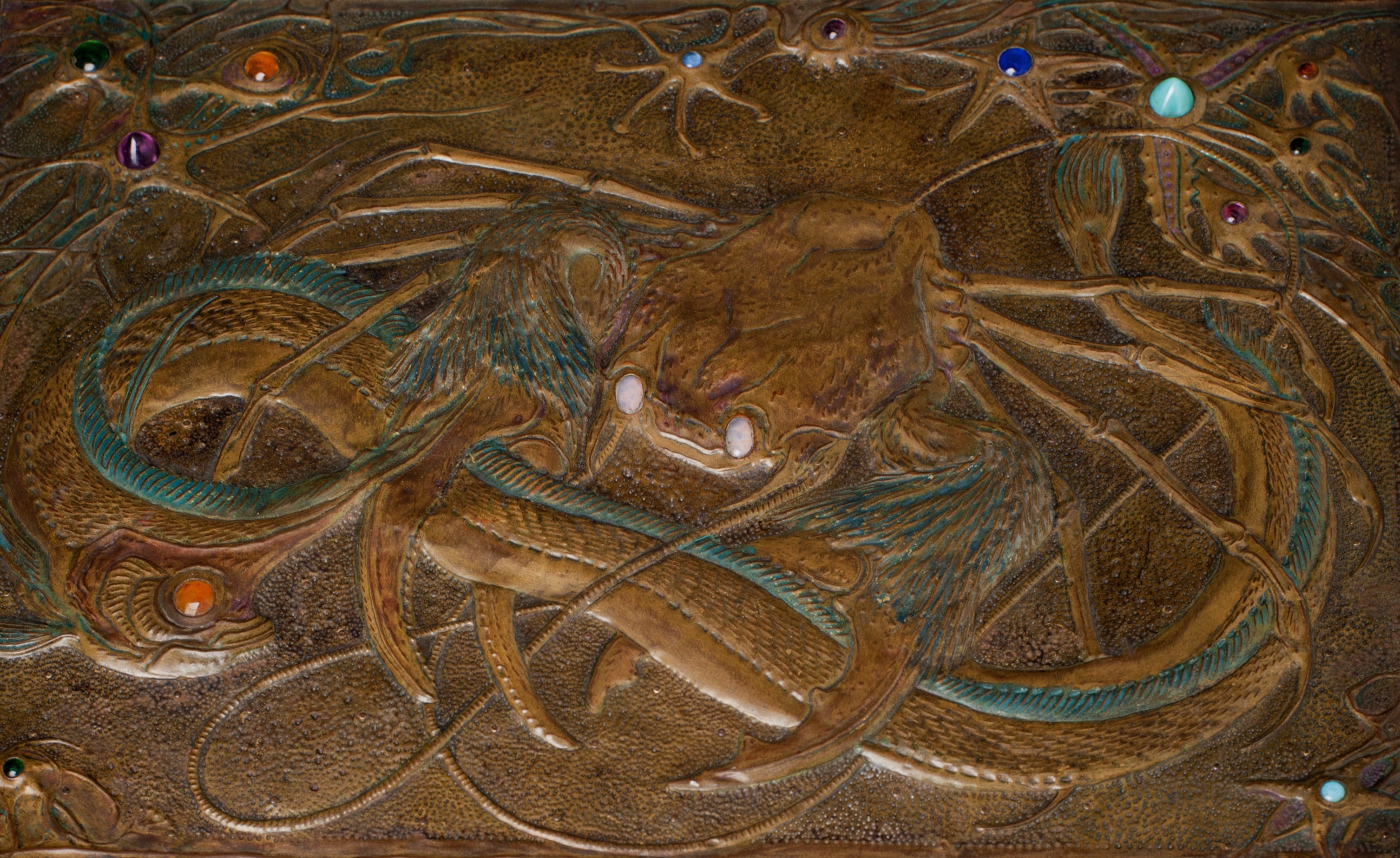
About the Seller
5.0
Gold Seller
Premium sellers maintaining a 4.3+ rating and 24-hour response times
Established in 2013
1stDibs seller since 2016
99 sales on 1stDibs
Typical response time: 7 hours
- ShippingRetrieving quote...Shipping from: Chicago, IL
- Return Policy
Authenticity Guarantee
In the unlikely event there’s an issue with an item’s authenticity, contact us within 1 year for a full refund. DetailsMoney-Back Guarantee
If your item is not as described, is damaged in transit, or does not arrive, contact us within 7 days for a full refund. Details24-Hour Cancellation
You have a 24-hour grace period in which to reconsider your purchase, with no questions asked.Vetted Professional Sellers
Our world-class sellers must adhere to strict standards for service and quality, maintaining the integrity of our listings.Price-Match Guarantee
If you find that a seller listed the same item for a lower price elsewhere, we’ll match it.Trusted Global Delivery
Our best-in-class carrier network provides specialized shipping options worldwide, including custom delivery.More From This Seller
View AllGerlach's Allegorien Folio, plate #58: "Sculpture" Lithograph, Gustav Klimt.
By Gustav Klimt
Located in Chicago, IL
As an artist trained in the applied arts, Gustav Klimt valued all forms of art, including the graphic arts. This final design from 1896 for inclusion in Allegorien published by Gerlach & Schenk demonstrates respect for artistic precedent and for a wide range of media and technique. The publication was printed in an unknown number of copies. Klimt’s rendering in latin of the title, “SCVLPTVR.,” with three-dimensional effect on the wall, is a figurative allusion to this medium as well as a literal reference to Ancient Rome. By doing the same with his signature and date in roman numerals on the right hand side of the image, Klimt places himself, The Artist, firmly in this linear and legitimizing context of art history and as its modern standard-bearer. Playing on Classical mythology and the story of Pygmalion, in which a statue comes to life, Klimt presents his modern Venus holding an apple. Klimt’s Venus exhibits a curvilinear softness; there are no angles. Klimt deftly shows the possibilities in a graphic image to give life to dark, wavy hair and tenderness to swelling breasts and belly. To further emphasize the allegory of thriving modern art, he contrasts his Venus with the cold, hard ancient classical head whose eyes are vacuous and whose hair is but a stylized mass of curls. Klimt’s living Venus stands in front of the large bust and large classical pillar upon which is a sculpture of a Sphinx and a Greek Attic bust. As if a gallery to represent sculpture’s “best of” through the ages, the upper horizontal panel includes bust depictions in marble, cast metal and wood...
Category
1890s Vienna Secession Figurative Prints
Materials
Lithograph
Max Eisler Eine Nachlese folio “Hygieia” collotype print
By (after) Gustav Klimt
Located in Chicago, IL
After Gustav Klimt, Max Eisler #10, Ausschnitt aus dem Bilde “Medizin”; multi-color collotype detail from Medicine, one of the faculty paintings for the Uni...
Category
1930s Vienna Secession Figurative Prints
Materials
Paper
Gerlach's Allegorien Folio, plate #53: "Junius" Lithograph, Gustav Klimt.
By Gustav Klimt
Located in Chicago, IL
Contributors to Gerlach & Schenk’s publications valued design and innovation in the graphic arts just as much as they examined allegories as subject matter for exploration. Here, Gus...
Category
1890s Vienna Secession Figurative Prints
Materials
Lithograph
H.O. Miethke Das Werk folio "Judith I" collotype print
By Gustav Klimt & K.K. Hof-und Staatsdruckerei
Located in Chicago, IL
Judith I, no. 9 from the second installment of Das Werk Gustav Klimts
Much like his treatment of the Classical personage, Danae, from Greek mythology, Klimt’s depiction of Judith takes an Old Testament character, a heroine who avenges the death of her husband by killing an Assyrian king, and firmly positions her in his present-day Vienna. His multicolored collotype rips the canvas from its gilded frame which directly references the subject with its title: “Judith und Holofernes”. Now in print form, Judith, holding the severed head of a male in murky shadow, is the ultimate Viennese femme fatale. Her likeness is unmistakably similar to a former lover of Klimt’s and famous Viennese soprano, Anna von Mildenburg. Though his allusion to ancient Assyria is apt, Klimt literally lifted the gold patterned background’s design motif from a relief detail from Sennacherib’s Palace displayed in a London museum. His context then is contemporary. In a sensual and sexually powerful tour de force, Klimt’s Judith...
Category
Early 1900s Vienna Secession Figurative Prints
Materials
Paper, Ink
H.O. Miethke Das Werk folio "Nuda Veritas" collotype print
By Gustav Klimt & K.K. Hof-und Staatsdruckerei
Located in Chicago, IL
DAS WERK GUSTAV KLIMTS, a portfolio of 50 prints, ten of which are multicolor collotypes on chine colle paper laid down on hand-made heavy cream wove paper wi...
Category
Early 1900s Vienna Secession Figurative Prints
Materials
Paper
Max Eisler Eine Nachlese folio “Allegory of Life and Death” collotype print
By (after) Gustav Klimt
Located in Chicago, IL
After Gustav Klimt, Max Eisler #18, Der Tod und das Leben; multi-color collotype after original painting (1910-1916) in oil on canvas.
GUSTAV KLIMT EINE NACHLESE (GUSTAV KLIMT AN AF...
Category
1930s Vienna Secession Figurative Prints
Materials
Paper
You May Also Like
Fulfilment-Metallic Poster. Printed in Austria
By Gustav Klimt
Located in Chesterfield, MI
Poster. Measures 16 x 11 inches and is Unframed. Good/Fair Condition-signs of wear consistent with age and handling (please see secondary images for details).
Category
Late 20th Century Portrait Prints
Materials
Lithograph
$140 Sale Price
20% Off
Expectation-Metallic Poster. Printed in Austria
By Gustav Klimt
Located in Chesterfield, MI
Poster. Measures 16 x 11 inches and is Unframed. Good/Fair Condition-signs of wear consistent with age and handling.
Category
Late 20th Century Portrait Prints
Materials
Lithograph
$140 Sale Price
20% Off
Original Vintage Secession Poster celebrating the emperor's jubilee
Located in Zurich, CH
Original Vintage Poster by the Austrian artist Ferdinand Ludwig Graf, a member of the Hagenbund. This Viennese artist association moved as soon a...
Category
Early 1900s Vienna Secession Figurative Prints
Materials
Paper
Beethoven Frieze (detail) by Gustav Klimt, Das Werk collotype, 1908-1912
By Gustav Klimt
Located in Chicago, IL
Original collotype created from a detail of Gustav Klimt’s Beethoven Frieze. Published and edited by Verlag H.O. Miethke and printed by k.k. Hof- und Staatsdruckerei, Vienna, in an e...
Category
Early 1900s Vienna Secession Prints and Multiples
Materials
Paper
Spring by Robert Engels, Medieval Art Nouveau lithograph with gold ink, 1897
By Robert Engels
Located in Chicago, IL
Allegorien-Neue Folge was a serialized folio published in installments between 1895 and 1900. Martin Gerlach, its publisher, was inspired by the rise of modernist design in Vienna an...
Category
1890s Vienna Secession Prints and Multiples
Materials
Lithograph
The Thirst, Plate 52 from Gerlach's Allegorien, Vienna Secession lithograph
Located in Chicago, IL
Wilhelm List, a friend and follower of Gustav Klimt, was a founder and leading member of the Vienna Secession and contributor to its official magazine, Ver Sacrum...
Category
1890s Vienna Secession Prints and Multiples
Materials
Lithograph
More Ways To Browse
Antique Vienna Plate
Vienna Art Plate
Antique Police
Austria Poster
Theseus Minotaur
Secession Poster Vienna
Vienna Secession Art Posters
Klimt Gustav Poster
Klimt Poster
The Avengers
Triple Self Portrait
Vitraux Pour Jerusalem
Walasse Ting Geisha
Wayland Moore
Whitney Poster
Yoshitoshi Taiso
1930s Woodblock
Ai Weiwei Tree
